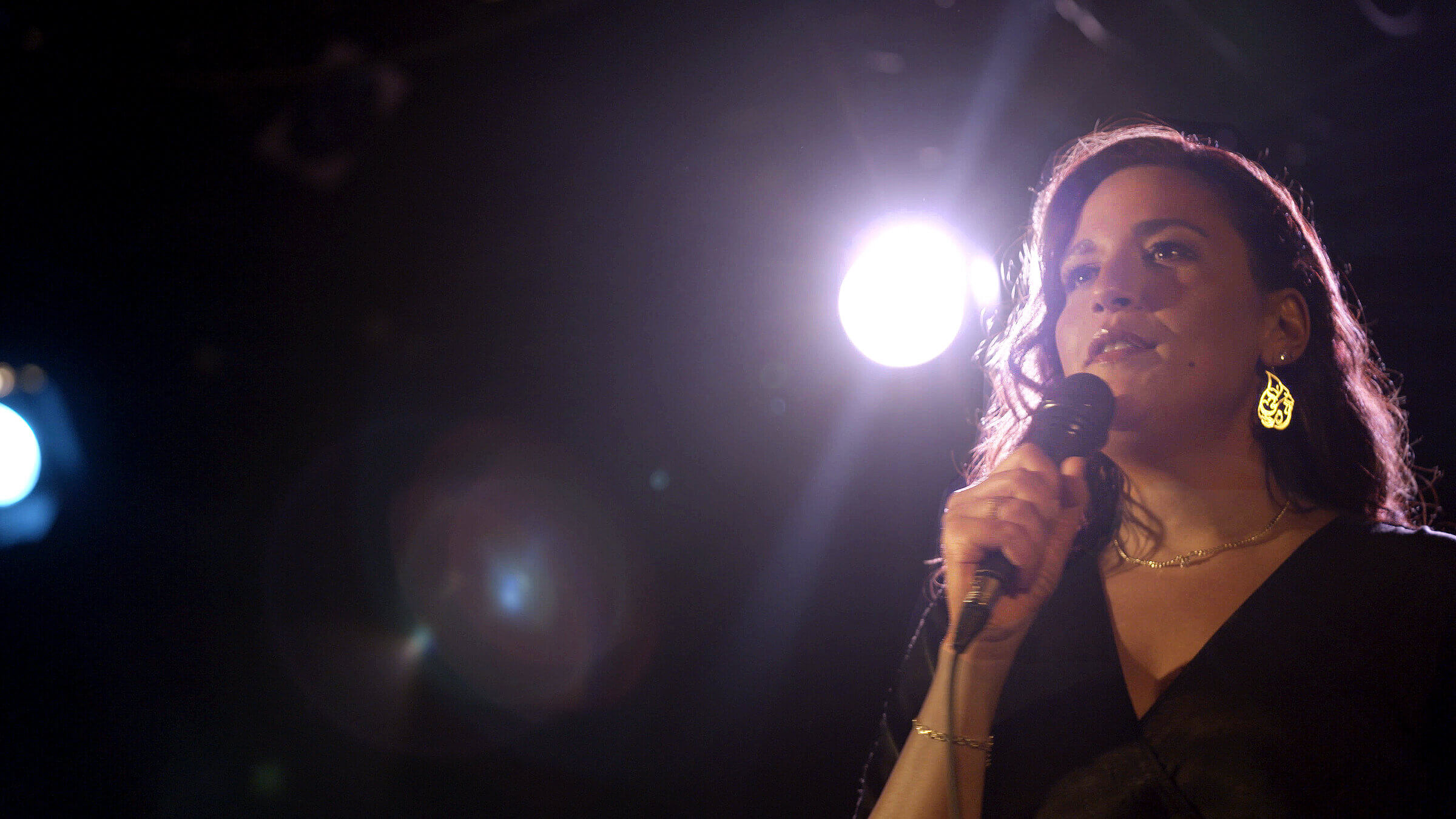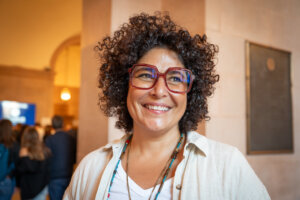In ‘Coexistence, My Ass!’ the anxiety of an Israeli influencer
Amber Fares’ documentary charts the artistic and political evolution of comedian and peace activist Noam Shuster Eliassi

Israeli comedian and peace activist Noam Shuster Eliassi is the subject of Amber Fares’ documentary. Image by Amber Fares
There are plenty of funny lines in Coexistence, My Ass! but make no mistake, this is not a comedy. As director Amber Fares follows Israeli comedian and peace activist Noam Shuster Eliassi from her excited 2019 arrival at Harvard on a stand-up and peace-building fellowship (who knew such a thing existed?!) through escalating political and pandemic problems to her anguish at the war in Gaza, the documentary is nothing less than a tragedy.
Shuster Eliassi leapt to fame in early 2019 with “Dubai Dubai,” a song of “peace and love” in the wake of the Abraham Accords which celebrated Arabs (“especially when they are 4000 miles away”). It was satire, in Arabic, on Israeli television (Shuster Eliassi also speaks Farsi). She was poking fun at Israel’s peace with UAE’s millionaires while both sides ignored “those who suffered the Nakba.” She properly went viral across the region, though, when she jokingly proposed marriage to Saudi Crown Prince Mohammed bin Salman on an Arabic-language program of the Israeli news channel i24. Arabic news outlets and social media were not sure what to make of it but Israeli and Western news outlets knew that the furor and fluster were newsworthy.
Shuster Eliassi notes in Coexistence that her movement to comedy vindicated her decision to move away from more serious peace-building. “20 years of peace activism, I influence 20 people. One joke about dictators, 20 million people saw it!” If she wanted to achieve her dream of peace in the Middle East, maybe she was right to use the power of social media to amplify her gift of making people laugh.
Filmed over five of the bleakest years for believers in democracy and equality in Israel, Coexistence also follows Shuster Eliassi from hope to despair. After the COVID-19 pandemic, Fares made a short documentary about Shuster Eliassi for the The New Yorker: “How One Woman Is Using Comedy To Speak Up About Palestinian Rights.” From that moment of hope, though, Benjamin Netanyahu’s anti-democratic push, Oct. 7, and the Israel-Hamas war render the 2021 film obsolete.
The title Coexistence, My Ass! changes its significance through the movie. Initially, Shuster Eliassi scoffs at “coexistence” as a risible minimum aim, one so boring it puts her to sleep. By the end of the movie in 2024, when extremists on both sides have succeeded in destroying trust in humanity and any hope for peace, even that low bar seems unattainable. The phrase — also the name of Shuster Eliassi’s stand-up show — is Coexistence, My Ass! because “coexistence” no longer even seems possible.
As a child of Romanian and Iranian parents in Neve Shalom/Wahat as-Salam (“Oasis of Peace”), Shuster Eliassi grew up in a particular limelight. Set up as a cooperative village where Israeli Jews, Muslims and Christians could live together, the small settlement of about 60 families was a regular stop for American peacebuilding luminaries. The documentary features archival footage of Jane Fonda speaking there in 2002 as well as a young Shuster Eliassi handing flowers to Hillary Clinton in 1998.

When the first IDF soldier from Neve Shalom gets killed, news crews come to the village and end up interviewing Shuster Eliassi, then a grade school student who had known him and looked up to him. Even as a young woman, Shuster Eliassi is able to voice her pain without becoming embroiled in the conflict. Indeed, one of the film’s most compelling arguments for something more than coexistence is her best friend from home, Ranin, an Arab. When Shuster Eliassi breaks her leg in an accident, Ranin pushes her wheelchair up a hill. They joke about Arabs and Jews (“How is it that the Arabs always end up serving the Jews?” Ranin asks.) They speak in Hebrew and Arabic, and argue about which language should come first in the name of their home, Wahat al-Salam/Neve Shalom. They are a visible embodiment of how easy it is to have an Arab-Jewish family, of how coexistence could be the least possible problem.
We see Shuster Eliassi perform in 2018 at East Jerusalem’s 1001 Laughs Palestine Comedy Festival. There she assures the uncertain audience that her set is short with a joke about the occupation: “I’m only staying for 7 minutes, not 70 years.” She adds that she stole the joke from the Palestinian-American emcee Amer Zahr. “But it’s mine now, God promised it to me!” she says. The crowd seems to love it.
Five years later, though, the atmosphere is much more tense. While the troubles had been escalating throughout 2023, Oct. 7 was a rupture, and Shuster Eliassi finds herself stuck between her communities. We see her called to condemn the people who committed the atrocities on Oct. 7 and also to condemn the government that is about to retaliate. She is aghast that there seems to be no time for her to mourn the human lives that were lost.
Fares, best known for Speed Sisters, her documentary about the first all-female car-racing team of Palestinian drivers in the West Bank, captures the ratcheted-up post-pandemic tempo. When Arabs and Jews are stuck, COVID-19-infected, in “Corona Hotel,” they live happily together; it’s only with the chance of an Arab-Israeli peace that excludes the (Iranians and) Palestinians that Hamas starts serious sabotage. Its rocket attacks, intercepted by the Iron Dome, change the feeling in Israel.
Instead of a country moving slowly towards coexistence and peace, Israeli news shows “Arabs being attacked live on TV.” An aggressive, shirtless, tattooed young Jewish skinhead is shown saying, “We came out to fight the Arabs. To show them they can’t just shoot rockets at us … If need be, we’ll kill them. If need be, we’ll murder them.” The sequence cuts to Jewish Israelis lynching an Arab.
Furthermore, as pro-Democracy, anti-Netanyahu protests continue, the occupation remains off the agenda. An older man, maybe from her parents’ generation, labels Shuster Eliassi an “enemy” of Israel for calling to end the occupation at a protest against the Israeli government.
Vivian Silver, one of the people killed in the Gaza envelope on Oct. 7, was a lifetime peace activist. She was a friend of my friends and a friend of Shuster Eliassi. At her funeral we see her son talking to Shuster Eliassi. “She didn’t work for peace so that when they come, they’ll spare her,” he says of his mother. “She worked so there’d be no reason for them to come.” It’s a position that is no longer tenable.
Ultimately, Coexistence, My Ass! isn’t about solutions, because it’s not naïve enough to pretend that there are any. It isn’t about both sides, although heaven knows there is plenty of blame to go around. It’s about staring with Shuster Eliassi down the line of peace and seeing massive objects fall across it. It’s not cathartic. It’s honest. And sometimes, honesty is the most radical thing a film can offer.
















